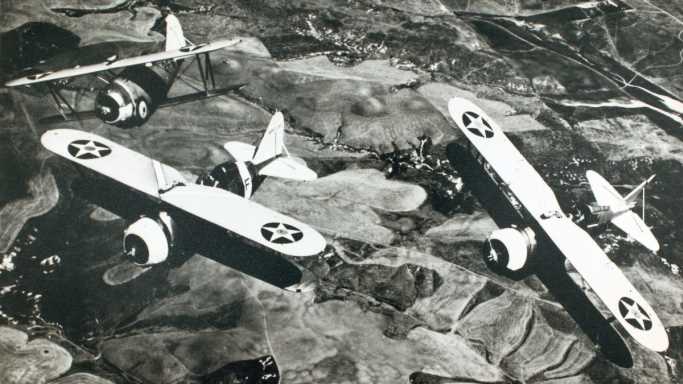The Wright brothers, Orville and Wilbur, are renowned as the pioneers of aviation, having successfully achieved the first powered, controlled, and sustained flight in 1903. This marked the birth of aviation, laying the foundation for the development of military aircraft in the early 20th century.
The United States was one of the first nations to field aircraft for military purposes, and this tradition has continued over the past century, paving the way for the development of more advanced and sophisticated warplanes, and culminating in arguably the premier air force on the planet. (And these are the largest air forces in the world.)
To determine America’s first military war plane and other notable early American military aircraft, 24/7 Wall St. reviewed former U.S. military aircraft from Military Factory. Planes are ordered according to the year they entered military service, from the very early planes to 1936, around the time jet propulsion was invented. We included supplemental information from Military Factory regarding types of aircraft, maximum speed, crew size, and what roles each aircraft played in the service.
One of the earliest warplanes employed by the U.S. military was the Curtiss JN-4 “Jenny.” Introduced in 1915, the Jenny became a workhorse for the Army Signal Corps during World War I. Its open cockpit design and wooden frame reflected the early engineering capabilities of the time. The plane played an important role in training aviators and conducting reconnaissance missions during WWI and the Mexican Revolution.
Another iconic warplane making this list is the T-6 Texan, which served as a primary trainer for countless aviators during World War II and beyond. Known for its distinctive appearance, with its characteristic inverted gull wings and sleek lines, the T-6 has been used not only for training but also in various roles, including ground attack and reconnaissance. Even today, modernized versions of the T-6 Texan continue to serve as trainers in air forces around the world, carrying forward its legacy as a key part of aviation history.
The early planes were nowhere near as fast as the modern jets and aircraft in the Air Force today. Part of this huge differential in speed is jet-propulsion technology, which was not tested in flight until late in 1939, well after most of these planes entered service. (Here are the 20 fastest American planes of World War II.)
Most of these early aircraft were also not used as fighters or interceptors like many of today’s military aircraft. Because the technology of that time did not allow for missiles or more sophisticated weaponry, many of these aircraft were used for scouting or reconnaissance to better understand enemy positions.
Here is a look back to the first American warplanes.
Sponsored: Tips for Investing
A financial advisor can help you understand the advantages and disadvantages of investment properties. Finding a qualified financial advisor doesn’t have to be hard. SmartAsset’s free tool matches you with up to three financial advisors who serve your area, and you can interview your advisor matches at no cost to decide which one is right for you. If you’re ready to find an advisor who can help you achieve your financial goals, get started now.
Investing in real estate can diversify your portfolio. But expanding your horizons may add additional costs. If you’re an investor looking to minimize expenses, consider checking out online brokerages. They often offer low investment fees, helping you maximize your profit.
Source: Read Full Article
-
Broadway Casting Shake-Up: Duncan Stewart To Head New RWS Entertainment Group Casting Arm As Stewart/Whitley And Binder Casting Dissolve
-
The Most Expensive Colleges in America
-
The World’s 11 Largest Warships
-
The Most Heavily-Armed American Ships in WWII
-
The Most Popular Revolvers Bought Online Last Year

